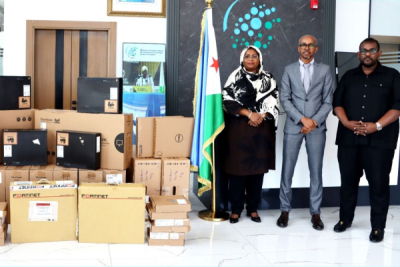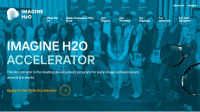-
Bottomline Assist offers global companies access to West African tech talent at competitive cost.
-
The platform provides end-to-end services, including technical screening, onboarding, payroll and compliance.
-
Clients reportedly pay 55% less than global outsourcing competitors while workers earn above local averages.
Africa is emerging as a strategic reserve of tech skills, and local players are organizing to connect this talent base to global markets with greater professionalism and efficiency. Bottomline Assist positions itself within this trend.
Bottomline Assist is a digital solution developed by a Nigerian startup that enables international companies to access qualified tech profiles—including developers, data scientists and support teams—at competitive cost.
The platform combines recruitment, technical screening and operational management to offer a single gateway to outsourced talent from West Africa. Based in Lagos, it launched in 2024 under the leadership of Francis Adelore.
The company builds its core offer on a strict selection process. It conducts local sourcing, technical tests and in-depth interviews to identify operational candidates quickly. Bottomline Assist complements this talent pipeline with managed services, including contracting, payroll, local compliance and onboarding.
Clients gain access to quality skills and lower salary costs while maintaining direct control over their teams. Local professionals receive international employment opportunities, often with upskilling programs and career support.
Francis Adelore says, “We have raised the bar for talent outsourcing in Africa with stricter requirements than most traditional firms regarding training, experience and communication skills.” He adds, “Meanwhile, our clients benefit from rates that are 55% more affordable than those of major global players. This creates a rare win-win situation: clients achieve significant savings while employees earn far higher wages than those generally offered by local employers.”
Bottomline Assist targets a rapidly expanding segment. Global demand for competitive tech resources continues to grow as companies search for alternatives to traditional recruitment channels.
By offering a combination of local sourcing and administrative services—such as payroll, compliance and HR management—the startup facilitates long-term collaboration between foreign companies and African talent.
This article was initially published in French by Adoni Conrad Quenum
Adapted in English by Ange Jason Quenum
-
Black Swan builds alternative AI-based credit-scoring tools for Africa’s informal economy.
-
The fintech won the 2025 MEST Africa Challenge and secured a $50,000 investment.
-
The company uses non-traditional data such as mobile-money flows and merchant-terminal activity to estimate borrower capacity.
Derick Kazimoto develops a new method to interpret economic traces and reshapes how lenders analyze credit risk. He opens access to previously untapped information that financial institutions use to refine their lending decisions.
Kazimoto, an entrepreneur and consultant based in Dar es Salaam, co-founded and currently leads Black Swan. The fintech, registered in Mauritius, builds alternative data-analytics tools that enable lenders to assess solvency with higher precision and broader flexibility.
Black Swan, founded in 2022, focuses its operations on the informal economy in sub-Saharan Africa. The company designs AI-based evaluation models that rely on non-traditional data to expand financing access for SMEs, micro-entrepreneurs, traders and individuals with limited banking history.
The company’s core product is an alternative credit-scoring engine. The system estimates the borrowing and repayment capacity of individuals or small businesses without depending on conventional bank-history checks. The models integrate mobile-money transactions, merchant-terminal receipts, recurring bill payments and a broad range of digital footprints. Lenders can combine these scores with their internal systems to refine risk models.
Black Swan won the seventh edition of the MEST Africa Challenge in November 2025. The award granted the company a USD 50,000 investment and entry into the MEST portfolio.
“Our mission is to make Africa bankable. We believe the continent is shifting from informal, collateral-heavy lending to data-driven credit. This transformation changes how banks and fintechs trust, lend and grow,” said Black Swan CEO Derick Kazimoto after the announcement.
Alongside his role at Black Swan, Kazimoto works as a fintech consultant for AfroPavo Analytics, a Tanzanian company that builds digital solutions using data analysis. He also co-founded Tausi Africa, an AfroPavo subsidiary that develops financial tools.
Kazimoto earned a bachelor’s degree in civil engineering from the University of Cape Town in 2019, followed by a master’s degree in financial technology in 2021. He began his career the same year as a data scientist at Spoon Money, a South African fintech. He later joined Akeo Tanzania, the development hub of the Akeo Group, where he served as country director from 2021 to 2022.
This article was initially published in French by Melchior Koba
Adapted in English by Ange Jason Quenum
-
Djibouti prepares to operationalize its new National Cybersecurity Authority.
-
The agency receives equipment and a defined mandate to oversee national cyber norms and incident response.
-
The move aligns with the country’s ambition to become a regional tech hub by 2035.
Djibouti plans to bring its newly created National Cybersecurity Authority (ANC) into service as the country pushes to position itself as a regional technology hub by 2035. The International Telecommunication Union (ITU) states that this ambition requires stronger commitments to cybersecurity to unlock the full potential of the digital economy.
Authorities advanced the ANC’s rollout last week during a meeting between senior officials from the Ministry of Digital Economy and the agency’s new director. The session reviewed the progress of ongoing cybersecurity projects, set priority cooperation areas, and organized the delivery of technical equipment.
The government supplies the agency with high-performance computers for incident response, international-standard firewalls and network-security systems, high-capacity servers for sensitive data, monitoring screens for security operations centers, and professional cybersecurity licenses. These tools aim to equip the ANC to oversee and enforce national cyber-defense measures.
The legislation establishing the ANC, which lawmakers examined on November 10, gives the agency responsibility for setting national cybersecurity norms and protection procedures for critical sectors. The law also mandates the creation of a national cyber-incident monitoring and response center, expanded international cooperation against cybercrime, and training and awareness programs for public and private actors.
This institutional buildup forms part of Djibouti’s broader push to secure its digital infrastructure as its digital transformation accelerates. The country has already adopted a National Cybersecurity Strategy and a Digital Code and hosts an annual National Cybersecurity Week. In October 2025 in Hanoi, Djibouti signed the UN Cybercrime Convention, joining 21 African nations among 71 global signatories. The country had previously ratified the African Union’s Malabo Convention on cybersecurity and data protection in November 2023.
Despite these steps, Djibouti remains in the second-to-last tier of the ITU Global Cybersecurity Index, posting 11.84 out of 20 in the legislative pillar. The ITU argues that Djibouti must increase efforts in organizational, technical and capacity-building domains, as well as in international cooperation, to close the gap with regional peers.
This article was initially published in French by Isaac K. Kassouwi
Adapted in English by Ange Jason Quenum
-
The government validated the 2026-2030 National Cybersecurity Strategy to strengthen digital resilience amid rising attacks.
-
Mali ranks Tier 4/5 in the ITU Global Cybersecurity Index 2024, reflecting only “basic” national capabilities.
-
Recent major breaches targeted the tax authority and Bank of Africa Mali, exposing gaps the new strategy aims to fix.
Mali faces growing cyberthreats and structures its national response. Authorities develop a roadmap to reinforce national resilience, modernize digital governance and protect increasingly targeted infrastructure.
The government formally validated the 2026-2030 National Cybersecurity Strategy during the Council of Ministers on Wednesday, December 5. The framework aims to strengthen the country’s digital resilience as cyberattacks multiply and risks increase across the digital transformation of the state and the economy.
“The sophistication of attacks and the financial damage they inflict on states and companies have turned cybersecurity into a global concern. Despite several legislative and regulatory texts adopted in recent years, Mali did not yet have a coordinated national strategy, which forced each actor to launch isolated actions,” the government said.
The roadmap aligns with major national development orientations, including “Mali Kura ɲɛtaasira ka bɛn san 2063 ma” and the 2024-2033 National Strategy for Emergence and Sustainable Development. These frameworks place digital transformation at the core of administrative modernization, public-service efficiency and economic growth.
The Ministry of Communication and Digital Economy announced the strategy at the start of the year. The plan responds to a situation authorities consider worrying. The ITU Global Cybersecurity Index 2024 ranks Mali at Tier 4 out of 5, a level that reflects “basic” capabilities in technical, organizational and skills-development components.
These limits became visible through several major attacks. In August 2022, Russian cybercriminals reportedly compromised data from 312,000 taxpayers at the Directorate General of Taxes. In February 2023, Bank of Africa Mali suffered one of the most significant cyberattacks recorded against a financial institution in the country. Identity theft and online fraud cases have also increased, affecting administrations, companies and individuals.
The implementation of the National Cybersecurity Strategy is expected to address the most urgent weaknesses in Mali’s digital ecosystem. The framework aims to strengthen the protection of critical infrastructure, create more consistent security standards, improve incident-response systems and structure cooperation with international partners.
Over time, the government expects the strategy to support a more reliable digital environment. Authorities see this as essential to sustain the digitalization of public services, encourage local innovation and attract additional investment into the digital economy.
This article was initially published in French by Samira Njoya
Adapted in English by Ange Jason Quenum
-
Gabon signed a partnership with UNCDF to modernize digital financial services and accelerate financial inclusion.
-
Mobile-money transactions reached CFA4,000 billion ($7 billion) in 2024, yet only 30% of adults hold a bank account.
-
The agreement prioritizes interinstitutional coordination and technical training on e-money governance, interoperability and consumer protection.
Gabonese authorities aim to better structure the ecosystem of digital financial services. After announcing a partnership with Visa in May, the government continues its efforts with a new agreement designed to strengthen financial inclusion and sector regulation.
The Ministry of Digital Economy, Digitalization and Innovation (MENDI) announced on Monday, December 8, the signing of a partnership with the UN Capital Development Fund (UNCDF). The collaboration seeks to reinforce the digital-finance ecosystem and support the national ambition to make digital technology a driver of state modernization and economic growth.
The initiative centers on two main priorities. The first focuses on interinstitutional dialogue to harmonize public policies, strengthen coordination between stakeholders and establish a permanent consultation framework for digital financial services. The second targets technical-capacity building through training programs for policymakers on key areas such as e-money governance, service interoperability, data protection, financial literacy and user protection.
Authorities also highlight a specific emphasis on reforms that promote competition among service providers, develop essential digital infrastructure and improve mechanisms for consumer protection.
The partnership builds on the national assessment carried out in 2024 by UNCDF. It comes as Gabon seeks to accelerate financial inclusion, which remains uneven. The country recorded more than CFA4,000 billion ($7 billion) in mobile-money transactions in 2024, along with nearly 368 million operations. Nevertheless, only 30% of adults hold a bank account, and rural populations, women and young people remain the most excluded groups.
Sector players regularly point to several obstacles, including service costs, incomplete interoperability between operators, limited financial literacy and weak user trust in digital tools.
The UNCDF intervention is expected to support reforms that modernize the ecosystem and create a more attractive environment for digital-financial-service providers. By reinforcing institutional cooperation, clarifying operational frameworks and improving infrastructure quality, authorities aim to stimulate innovation, attract new services and expand access to more reliable and affordable payment, savings and transfer solutions.
This article was initially published in French by Samira Njoya
Adapted in English by Ange Jason Quenum
-
ELLES, created in 2022, offers cycle tracking, contraception information and cancer-prevention alerts.
-
The app distributes continuous health content and guides women in daily reproductive-health management.
-
Founder Viviane Oké, a Beninese medical doctor, combines medicine and digital-health strategy to support women’s autonomy.
Viviane Oké introduces a digital solution that strengthens the health autonomy of its users. She deploys a tool that reshapes how women receive support in their daily health management.
Oké, known as Dr. V, is a Beninese medical doctor active in the digital-health sector. She serves as chief executive of ELLES, an application she founded with a group of young Beninese doctors to improve reproductive-health monitoring for women.
ELLES, created in 2022, focuses on reproductive health. The application enables girls and women to track their menstrual cycles and access information on contraceptive methods. It distinguishes natural methods and details their benefits and potential side effects.
The platform also supports breast-cancer prevention by sending alerts at the optimal moment for self-examination and by providing a detailed guide. An integrated news feed delivers a continuous flow of content on the body, sexual health and reproductive health.
Oké graduated from the Faculty of Health Sciences in Cotonou, where she earned her medical doctorate. She also completed a master’s degree in international project management in October 2025 at Senghor University in Alexandria, Egypt.
She worked as a medical translator in 2021 for Smile Train, an international children’s organization. She served in 2022 as a fintech-technology consultant for the GIZ office in Benin. In February 2025, she worked as a physician at Clinique Patte d’Oie in Cotonou.
This article was initially published in French by Melchior Koba
Adapted in English by Ange Jason Quenum
Goodwell Investments is seeking partnerships with revenue-generating companies across Africa. They specifically target enterprises led by African founders that provide essential goods or services with a strong social or environmental impact. Selected companies will receive funding, hands-on operational support, mentorship, and access to an extensive global network. Submissions are due online by Wednesday, December 31, 2025.
The Imagine H2O Accelerator has opened its application window to African water startups. Eligible companies must be under seven years old, have less than $5 million in revenue, and have secured less than $10 million in total funding. This program is non-equity-taking and provides mentorship, specialized training, and introductions to a massive worldwide network of industry leaders, investors, and founders. The application deadline is December 31st.
South African enterprise AI startup Ageiro has raised 3 million dollars to scale its autonomous agent platform, which turns business objectives into production-ready applications within days. The company plans to use the funding to strengthen its decision models, enhance compliance tooling and expand commercial operations, framing software autonomy as a core driver of enterprise digital transformation.
- Norbert Haguma founded Swapinga in February 2025 to provide vehicle financing for micro-entrepreneurs.
- The platform requires a 20% down payment and approves applications within seven days without demanding real estate collateral.
- Haguma brings experience from previous roles at Smart Africa, SPENN Technology, and NALA.
Entrepreneur Norbert Haguma is reshaping economic inclusion in a sector where financing remains a major hurdle. He utilizes technology to transform how drivers access their work tools.
Norbert Haguma specializes in fintech, mobility, and Africa-China relations. He serves as the founder and CEO of Swapinga. The company focuses on financial technologies and mobility solutions. Haguma established the firm in February 2025. Swapinga targets drivers and micro-entrepreneurs who seek vehicle ownership. The platform offers a simplified financing solution to boost their revenues. The company aims to remove the primary barriers regarding access to automotive credit.
The system relies on a four-step process. The candidate submits a request via an online form. The team reviews the file and provides an answer within seven days. Successful applicants must open a bank account. They subsequently pay a 20% down payment on the purchase amount. The driver then takes possession of the vehicle to launch or expand their business.
Swapinga promotes a model that requires neither land nor housing as collateral. This feature is decisive for drivers who traditional banks often exclude. The enterprise specifically targets actors in the taxi ecosystem and mobility platforms such as YEGO.
Haguma holds a seat on the board of the Pan-African Council. This organization commits to the unification of Africa and its diaspora. He also acts as a Senior Associate at Africa Equity Group. This firm provides operational consulting, market analysis, and financial support.
Haguma created his first enterprise, AfrOrient Group, in China in 2009. The company operates in trade and investment. He subsequently co-founded the edtech startup Kiziga in China in 2012. This startup develops a platform that allows Africans to apply, pay, and obtain documents for studies in China. He participated in the creation of AfricaGen in Kigali in 2018. This organization dedicates itself to mobilizing Africans through technology.
Norbert Haguma holds a degree from Beijing Jiaotong University. He obtained a bachelor's in computer science and technology and a master's in business administration there. He joined the Embassy of the Republic of Rwanda in China as an IT engineer in 2009.
Haguma became the head of the Blockchain Hub and the African hub for digital transformation at Smart Africa in 2018. He worked at SPENN Technology from 2020 to 2024. He successively occupied the positions of Country Director for Rwanda, Head of Africa Partnerships, and Non-Executive Director. He served as Country Director for the fintech NALA in Rwanda between September 2024 and February 2025.
This article was initially published in French by Melchior Koba
Adapted in English by Ange Jason Quenum
More...
- Mobidoto, created in January 2025, delivers offline-friendly digital training for community health workers.
- The platform offers structured modules, continuous training pathways and formal certification.
- The startup launched DotoIA in November 2025, a free WhatsApp-based revision assistant for health students.
Maessarath Rafiou, a Beninese medical doctor, founded and leads Mobidoto, a social-impact company that focuses on digital training for African health workers. She created Mobidoto in January 2025 and designed the platform as a continuous-learning tool usable in professional settings, including areas with weak connectivity. The application offers training pathways, structured modules and a certification system that validates acquired skills.
The Mobidoto website includes a “Resources” section that hosts educational materials, including e-books accessible through a dedicated page. These materials complement the app’s training modules and give health professionals practical tools for daily work. The platform mainly targets community health workers, aspiring community health workers, community relays, nurses, midwives and doctors.
The startup launched DotoIA in November 2025, a free revision assistant for health students available via WhatsApp. The chatbot delivers simplified explanations, short quizzes and full mobile access that works even under limited connectivity. The tool aims to support students as they prepare for exams.
Rafiou practices medicine at Dr Pierre Boni Clinic in Benin. She also founded and presides over OASIS Benin, an organisation created in 2017 that supports preventive care across Benin and the sub-region through awareness campaigns, information sessions and health-promotion initiatives.
She graduated from the Faculty of Health Sciences in Cotonou, where she earned a medical doctorate. Between 2016 and 2017, she served as project manager for Benin Health Movement, an organisation engaged in health-promotion activities in Benin.
This article was initially published in French by Melchior Koba
Adapted in English by Ange Jason Quenum
Investisseurs & Partenaires has completed a first close of €41 million (about $47.7 million) for its Africa Entrepreneurs 3 fund. The fund is targeting $81.5 million in total and expects a second close in 2026. It plans to invest $1.2 million to $5.9 million in 15 to 20 small and medium-sized enterprises operating in sectors including education, health, energy, agribusiness, logistics, financial services and manufacturing, with a strong emphasis on climate and gender impact.
Pan-African fund Five35 Ventures has received an anchor investment from the Mauritius-based Mennonite Economic Development Associates (MEDA), which manages the Mastercard Foundation Africa Growth Fund. The capital will strengthen Five35 Ventures’ backing for women-led technology startups across East, West and Southern Africa. The fund seeks to bridge the gap between seed funding and scaling up by combining capital, strategic guidance and access to a broad network of mentors and investors.
Send by Flutterwave, a money-transfer service, is rolling out a physical naira card for Nigerians living abroad who are visiting the country over the holidays. The card is linked to the app and can be topped up with U.S., European or U.K. bank cards. It works on POS terminals, ATMs and contactless payment systems across Nigeria. The product is designed to help visitors bypass cash-withdrawal limits, unstable exchange rates and frequent problems with foreign cards.















